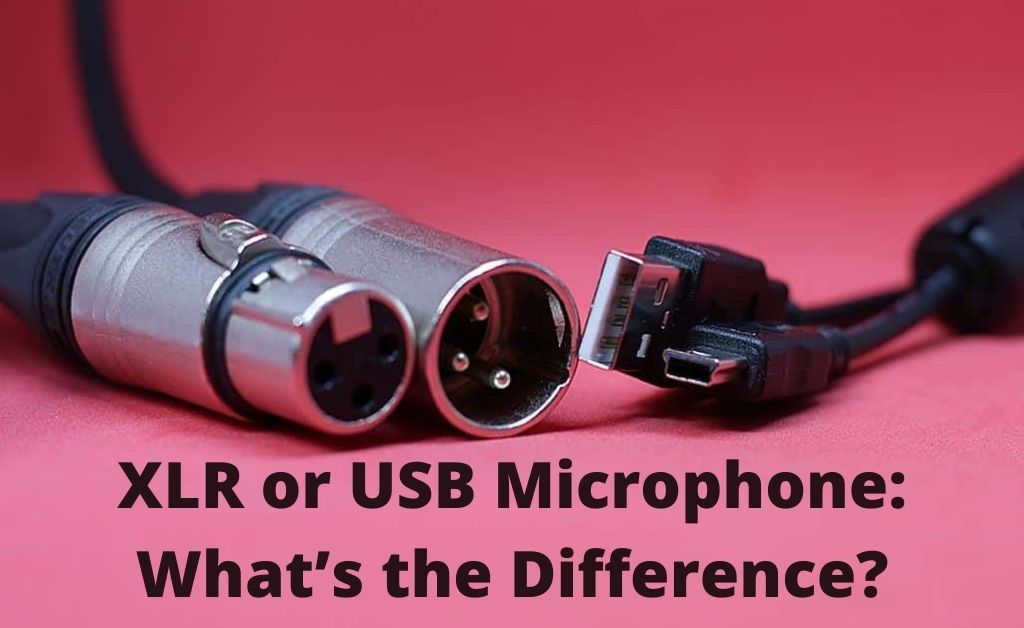
Podcasts reflect the live-studio audio in the means of communication where you can’t overlook the quality of the recorded audio. And, when it comes to recording audio clips, microphones are unskippable. Apart from falling for the right microphone, the connectivity channels also matter. And, that’s how you reach a conclusion of deciding the best type of microphones: USB mic vs XLR.
The battle between these two has never been easy as both have got their own advantages. It’s your aspects and requirements that would decide the best vocal and podcast-suited microphones for your next venture. Let’s check what these are and what suits your preferences.
XLR Microphone
XLR is the abbreviation for the word External Line Return. An XLR microphone is one that has got XLR connectivity with three pins. Generally, professional music composers or film-makers use such a microphone for enhanced audio output.
Benefits of using an XLR Microphone
Why do professionals favour XLR ones in the battle between USB vs XLR mic? Well, here are some note-worthy key factors for sticking to the XLR mics:
- You can avail personalization because the audio can be projected over an interface. Thus, you grab more chances when it comes to scalability and adaptability of the XLR microphones. And, you can adjust the number of microphones depending on the number of guests in your podcast show.
- Another benefit of XLR microphone is that they are quite durable. You can consider individual part repairs when you are having trouble with a significant component of the microphone.
- On the other hand, you need not attach XLR microphones to the computer. They can work without non-digital collaboration, as well. Thus, you can avail a smooth professional finish to your audio recordings.
Drawbacks of XLR Microphone
Before you decide to purchase an XLR one, we would like to remind you of the cons of having an XLR mic.
- The major disadvantage of the XLR mic is- its expensive nature. You have to dig your pockets deeper to get one.
- Additionally, the entire system lacks portability. It’s not the perfect device that you can carry from street to streets.
Examples of XLR Microphones
If you want to out-stand the quality of the recorded podcast seasons, then customization is one feature that you should never overlook. That’s why you should entrust only an XLR microphone and here are some notable choices:
- Shure SM7B
- Heil PR-40
- Audio- Technica AT2005
- Rode PodMic
- Stellar X2
- Electrovoice RE20
USB Microphone
Every computer has USB connections, and a microphone that supports USB connectivity is called a USB microphone. And, if you have compatible USB cables, then there is no hindrance in connecting and recording audio for your podcast. USB connectivity justifies the speed of data transfer for vocals and podcasts.
Pros of USB Microphone
Well, many professional podcast creators prefer USB mics when there is a conflict of USB microphone vs XLR. Here’s why they favour USB mics:
- You can directly attach the microphone without depending upon any interface. And, every computer acquires USB ports. Thus, USB microphones are highly compatible with almost any kind of device.
- Additionally, you need not break all your savings in order to grab one USB mic.
- They are extremely portable, as they flaunt a compact design. And, setting them up is no mess.
Cons of USB Microphone
Well, USB microphones have got some drawbacks as follows:
- First, they are prone to breakage. And, if they break you have no other choice other than replacement. That’s why some prefer XLRs, when there is an ongoing debate regarding USB vs XLR microphone.
- When you have to avail more than one microphone, it’s not easy to connect them to a single computer. On the other hand, you can’t use dedicated software for customization.
USB Microphones for Vocals and Podcasts
If you are just a beginner and can compromise with the connectivity issues, then you can go with a standard quality USB microphone. Thus, USB microphones are a clear winner in the fight between USB mic vs XLR, if you consider the budget options.
Here are some of the personal favourites of globally-renowned podcast entertainers:
- Rode Podcaster
- Samson Go Mic
- Audio- Technica AT2020 USB
- Blue Yeti
- Audio- Technica ATR 2100 USB
What to Buy: USB vs XLR Microphone?
While choosing a microphone– the technology, connectivity, polar pattern, durability, aesthetics and portability are the prime deciding factors. It depends upon your necessities and preferences that you are seeking, with respect to the qualities of the microphone.
If budget and portability are not constraints then, XLR mic is always a choice of industry precision and perfection. Or, you can have both and use them accordingly. Therefore, you need not encounter any contradiction or complication, if the busy streets become your studio.
Frequently Asked Questions:
Does XLR to USB reduce quality?
Is USB or XLR better for gaming?
If you want to incorporate extra pro audio gear into your set-up, such as numerous microphones, audio mixers, or outboard signal processors, hit SELECT and choose an XLR Microphone in the EQUIPMENT window.
